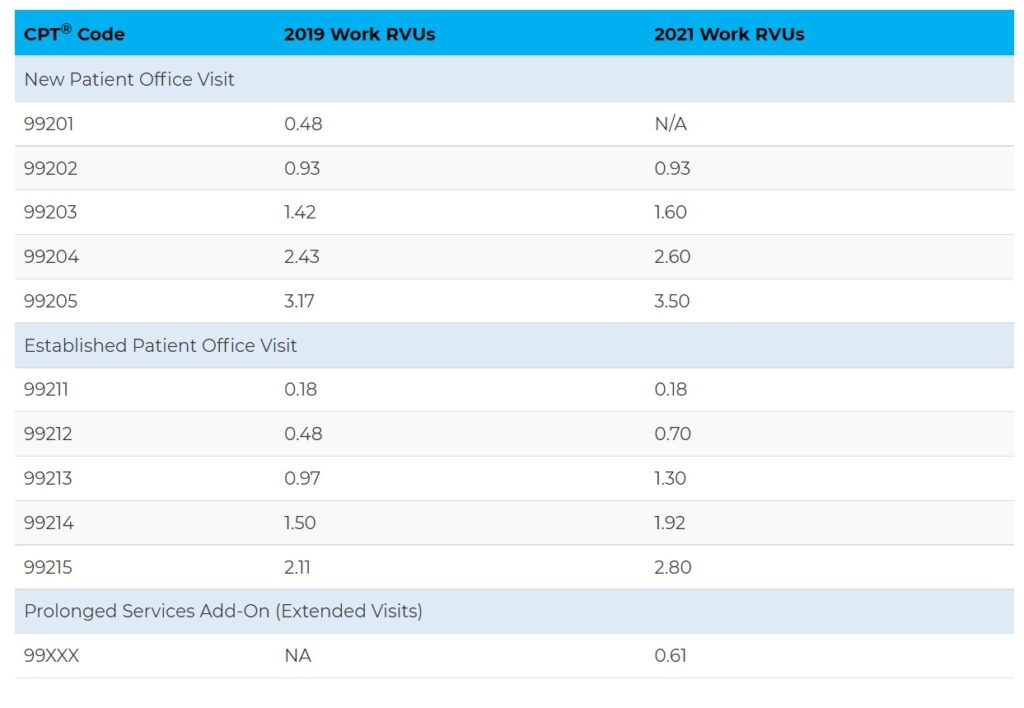RVU Based Contracts And What To Avoid
Flat salary compensation models are becoming less common. Instead, production models have become much more popular. These contracts are often called an RVU based contract. Today’s post I will go through RVU based contracts and what you need to know to avoid in these contracts.
RVU
When you submit a bill to insurance companies, they assign a value to each code. This is called a Relative Value Units, or RVU. Exactly how an RVU is calculated, well that is beyond the scope of this article. That is complex and would take an entire post by itself. To learn more about how an RVU is decided, AAPC has a good write up.
RVU values in 2021 were altered. Outpatient new office visits and follow up visits saw their values increased.

Most doctors who derive much of their income from office visits, saw a pay increase because of this change in 2021.
How RVU’s Will Be Reimbursed
This may sound like a simple question. How are the RVU’s going to be paid?
Some key factors to consider:
- What is the rate per RVU?
- Will the reimbursement rate be a flat rate or a variable rate?
- What happens with uninsured patients?
- How long until you get paid?
- What exactly is the list of what they are counting toward your RVU total?
Reimbursement Rate Per RVU
Medicare, Medicaid, and private insurances have varying amounts they pay for each bill submitted by a doctor. Most of the time, a company who hires a doctor will set a flat rate for RVU reimbursement to each provider. Flat rates are easier to pay providers rather than calculating RVU’s what each various insurance pays. Be sure to have an understanding of how the RVU’s are calculated and paid out for work performed.
Lets say Medicare pays $50 per RVU in your area but you are getting offered $42 per RVU. What may be going into that calculation is uninsured population or people that never pay their medical bills. Your group should know what that percentage rate tends to be for their group and will factor that into reimbursement offer.
If you have an offer that sounds very low, you probably are going to be practicing in a high uninsured area, high Medicaid area, or this may tell you that the group does not do a good job of collecting on medical payments. Of course, the other option is that they just want to see how low they can pay you.
Tiered RVU Contract
Every business has overhead costs. However, that needs to also be accounted for when being offered an RVU based contract.
Most practices let’s say have overhead at 50% of collections. If that overhead is met at 4,000 RVU’s, then why should you have to keep taking out that overhead for the extra work you are doing?
If you decide to pick up extra shifts, the company will still take out 50% for your collections for overhead, even though that overhead has already been paid for. Now, you’re not a partner in the business. Don’t expect to be paid completely like an owner of the practice where 100% of that money goes to you.
However, I do think that some type of tiered model makes sense since after overhead is met, you should be keeping more of the profits in your pocket.
Audit: Make Sure You Have Access To The Billing
As in my previous post, make sure you have access to your billing and accounts receivable. Any company that does not provide basic access to your billing questions is an immediate “Not interested in working for you” in my book.
I personally have done an audit on my RVU’s 4 times so far (each quarter). Each time I do an audit, I find some very eye-opening results.
For example, I have been billing for prolonged services with some cases (CPT: 99354). I’ve billed for this code when I have spent on the rare occasion, an hour longer than normal for select level of care. Turns out that when I ran an audit, the billing agency did not reimburse for a single RVU billed at this code. I sat down with the coders and reviewed the guidelines for Medicare. Turns out that Medicare has such strict rules that it takes more time and effort by the coders than is received by insurance payout. For this reason, they opted to stop even submitting these codes and paying providers for this particular code submitted. In effect, I was wasting my time by using this code.
Mortgage Companies Might Not Give You A Loan
When going to buy a house, I ran across an interesting problem. Some mortgage companies became wary of my unpredictable income from an RVU only contract. Many of the banks that billed themselves as providing “doctor mortgages” refused to work with me and my production-based contract. Even though I was an employee and not an independent contractor, some banks refused to give me a mortgage due to fluctuating income.
Each bank that refused to pre-approve me for a doctor mortgage told me the same thing. They want 2 years of tax returns with an RVU only contract before they would consider giving me a mortgage. I ended up finding several banks who would work with me, but they were the smaller ones. The large banks (Wells Fargo, Chase, etc.) all told me no.
RVU Based Contracts Are Now The Norm
Most contracts that I have had people send me to look over have some degree of salary plus RVU production.
With the high student loan debt many new graduates face, most new doctors are not willing to take a 100% RVU based contract.
It is much more likely that you will be offered a hybrid. For example, one job I interviewed with offered $150,000 salary and a generous RVU production model. They provided me with the data to show that most people in their group made above $250,000 a year with this model.
Know The RVU Threshold
Let’s say you are an outpatient doctor, and they tell you that you must hit 5,000 RVU before any production RVU metrics are met in your contract.
The most complex outpatient new patient is 3.5 RVU’s. This means that only billing for this one code, you would have to see 14 new complex patients (level 5 patients) a day before you hit any of your production thresholds. That sounds terrible.
Get to know if the threshold they are setting for you is realistic. Search on Google for “[your procedure code] RVU value” to get an idea of what you can expect.
Know The Additional RVU Codes
If your office will have you reading your own EKGs, echos, or PFTs then you need to ask how many the average doctor bills for.
A good way to hit your metrics is to learn how to bill for everything that you are doing. If you can quickly review and bill for 10 EKG’s a day in your group, that is essentially the same as a new level 4 patient every day.
Maybe you are a palliative care doctor, learn how to bill for transition of care codes, advanced care planning codes since you certainly are having this discussion and can bill for work that you are performing (Remember to always bill accurately. Never inflate billing unethically or illegally.)
The Difference Learning How To Bill Appropriately Can Make
Let’s say we have two doctors. One who does not know how to bill and another that does not.
Scenario:
A patient’s family recently took a patient home from the hospital. The hospitalist called the primary care doctor to tell them about what happened and how the family is considering palliative care, but they wanted to take the patient home and meet with the primary care doctor ASAP to talk about next steps. The patient was seen in the office four days after leaving the hospital. During the visit, a 20-minute discussion with the family about goals of care occurred.
Doctor A billed a level 5 follow up visit (99215) worth 2.8 RVU for the visit.
Doctor B may bill for the transition of care code 99496 which is 3.79 RVU. This doctor also bills for 99497 which is 2.49 RVU for the advanced care planning.
| Difference In Billing | ||
| Total RVU | ||
| Doctor A | 2.8 | |
| Doctor B | 6.28 |
Massive difference. 225% more in RVU for the same visit.
My Thoughts On An RVU Based Contract
If you learn how to bill for the work that you are already doing, then you will probably make more money with an RVU based contract.
If your documentation is lacking, or you have no desire to learn about billing, then an RVU based contract will not be for you.
I do not want to debate the American system and how right or wrong it may be. The RVU based contracts and billing have many flaws. However, it is how your medical practice gets paid in the current system. If you learn how the system works, then you can learn how to get paid appropriately for every service you are giving to your patients.
YouTube






Thank you for this article. this was quite helpful
99497 is 1.5 rvu